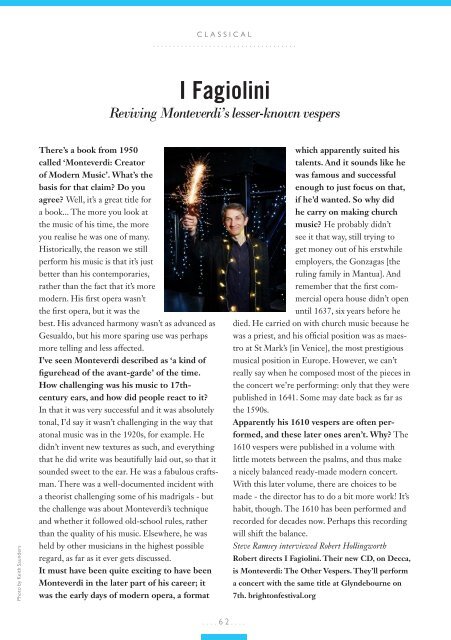Viva Brighton Issue #51 May 2017
Create successful ePaper yourself
Turn your PDF publications into a flip-book with our unique Google optimized e-Paper software.
CLASSICAL<br />
....................................<br />
I Fagiolini<br />
Reviving Monteverdi’s lesser-known vespers<br />
Photo by Keith Saunders<br />
There’s a book from 1950<br />
called ‘Monteverdi: Creator<br />
of Modern Music’. What’s the<br />
basis for that claim? Do you<br />
agree? Well, it’s a great title for<br />
a book... The more you look at<br />
the music of his time, the more<br />
you realise he was one of many.<br />
Historically, the reason we still<br />
perform his music is that it’s just<br />
better than his contemporaries,<br />
rather than the fact that it’s more<br />
modern. His first opera wasn’t<br />
the first opera, but it was the<br />
best. His advanced harmony wasn’t as advanced as<br />
Gesualdo, but his more sparing use was perhaps<br />
more telling and less affected.<br />
I’ve seen Monteverdi described as ‘a kind of<br />
figurehead of the avant-garde’ of the time.<br />
How challenging was his music to 17thcentury<br />
ears, and how did people react to it?<br />
In that it was very successful and it was absolutely<br />
tonal, I’d say it wasn’t challenging in the way that<br />
atonal music was in the 1920s, for example. He<br />
didn’t invent new textures as such, and everything<br />
that he did write was beautifully laid out, so that it<br />
sounded sweet to the ear. He was a fabulous craftsman.<br />
There was a well-documented incident with<br />
a theorist challenging some of his madrigals - but<br />
the challenge was about Monteverdi’s technique<br />
and whether it followed old-school rules, rather<br />
than the quality of his music. Elsewhere, he was<br />
held by other musicians in the highest possible<br />
regard, as far as it ever gets discussed.<br />
It must have been quite exciting to have been<br />
Monteverdi in the later part of his career; it<br />
was the early days of modern opera, a format<br />
which apparently suited his<br />
talents. And it sounds like he<br />
was famous and successful<br />
enough to just focus on that,<br />
if he’d wanted. So why did<br />
he carry on making church<br />
music? He probably didn’t<br />
see it that way, still trying to<br />
get money out of his erstwhile<br />
employers, the Gonzagas [the<br />
ruling family in Mantua]. And<br />
remember that the first commercial<br />
opera house didn’t open<br />
until 1637, six years before he<br />
died. He carried on with church music because he<br />
was a priest, and his official position was as maestro<br />
at St Mark’s [in Venice], the most prestigious<br />
musical position in Europe. However, we can’t<br />
really say when he composed most of the pieces in<br />
the concert we’re performing: only that they were<br />
published in 1641. Some may date back as far as<br />
the 1590s.<br />
Apparently his 1610 vespers are often performed,<br />
and these later ones aren’t. Why? The<br />
1610 vespers were published in a volume with<br />
little motets between the psalms, and thus make<br />
a nicely balanced ready-made modern concert.<br />
With this later volume, there are choices to be<br />
made - the director has to do a bit more work! It’s<br />
habit, though. The 1610 has been performed and<br />
recorded for decades now. Perhaps this recording<br />
will shift the balance.<br />
Steve Ramsey interviewed Robert Hollingworth<br />
Robert directs I Fagiolini. Their new CD, on Decca,<br />
is Monteverdi: The Other Vespers. They’ll perform<br />
a concert with the same title at Glyndebourne on<br />
7th. brightonfestival.org<br />
....62....


















